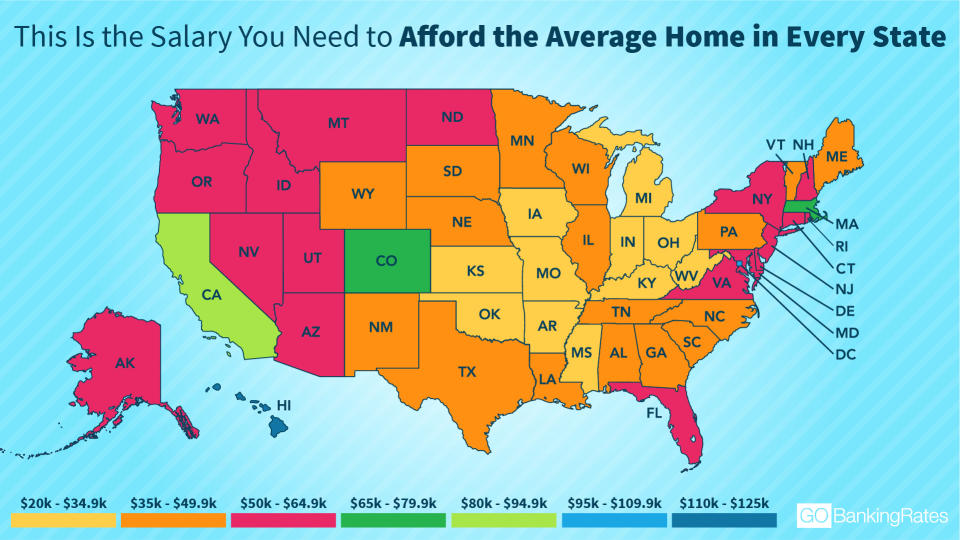Study Finds the Ideal Salary You Need to Own a Home in Your State

Owning a home has long been a key component of the American dream. However, with the considerable cost of housing on the rise, it can be hard to estimate the income needed to own a home in the U.S.
A new study from GOBankingRates found the minimum salary needed to afford a home is much steeper in some states than others.
Keep reading to see the cities where most Americans can’t afford a home.
The study determined each state’s average monthly mortgage payment based on the median list prices in the state and the average APR on a 30-year fixed rate mortgage. Then, assuming that 30 percent of your monthly income is devoted to this specific housing cost, GOBankingRates worked backwards to determine the ideal income that would allow you to afford that average mortgage payment.

At the upper end, Hawaii would require an annual income of $110,520 to afford the staggering $2,763 mortgage payment that would be typical for the state. On the other end of the spectrum, homeowners in Ohio can expect to secure an average mortgage for a little over $700 a month, meaning they would only need to earn $28,800 per year to afford their mortgage.
It’s also clear that, if you’re looking for a place where you can buy a decent home without needing to make a mint, the upper Midwest might be your ticket. Three bordering states in the Great Lake basin — Indiana, Michigan and Ohio — are among the five states with the lowest salary necessary to afford a mortgage there.
The costliest states, meanwhile, seem to be on the coasts. The 10 states with the highest income needed to afford a house include just three — Nevada, Colorado and Utah — that aren’t on the ocean (not including DC). Four of the five U.S. states that are on the Pacific Ocean are among the 10 priciest states to own a home in (Alaska being the odd Pacific state out). Meanwhile, Massachusetts, New York and DC on the Atlantic are all also among the 10 costliest.
Here’s a look at how much you need to earn a year to afford a home in all 50 states and the District of Columbia:
Alabama — $36,760
Alaska — $51,320
Arizona — $50,880
Arkansas — $31,320
California — $89,280
Colorado — $73,600
Connecticut — $55,360
Delaware — $51,040
District of Columbia — $97,280
Florida — $52,640
Georgia — $44,760
Hawaii — $110,520
Idaho — $51,560
Illinois — $37,840
Indiana — $31,320
Iowa — $32,400
Kansas — $31,760
Kentucky — $32,600
Louisiana — $38,080
Maine — $42,320
Maryland — $54,920
Massachusetts — $75,360
Michigan — $30,680
Minnesota — $46,720
Mississippi — $33,120
Missouri — $31,800
Montana — $55,640
Nebraska — $37,040
Nevada — $55,680
New Hampshire — $51,720
New Jersey — $51,720
New Mexico — $40,960
New York — $64,360
North Carolina — $46,600
North Dakota — $54,480
Ohio — $28,800
Oklahoma — $33,640
Oregon — $64,040
Pennsylvania — $35,760
Rhode Island — $51,960
South Carolina — $44,800
South Dakota — $40,880
Tennessee — $42,280
Texas — $49,840
Utah — $61,840
Vermont — $46,960
Virginia — $53,400
Washington — $64,200
West Virginia — $29,240
Wisconsin — $36,040
Wyoming — $44,600
Now, click through to see how many hours you have to work to afford a home in your state.
Methodology: To find the minimum salary need to own a home in every state (except North Dakota, whose median home list price information was sourced for Realtor.com) and the District of Columbia, GOBankingRates calculated the average mortgage payment in every state using the state’s median home list price and the average APR on a 30-year fixed loan, sourced from Zillow. Using the general rule of thumb that no more than 30 percent of your income should go toward housing, we then calculated the annual income needed to afford the average mortgage payment in every state.
This article originally appeared on GOBankingRates.com: Study Finds the Ideal Salary You Need to Own a Home in Your State

